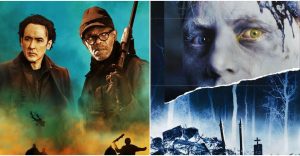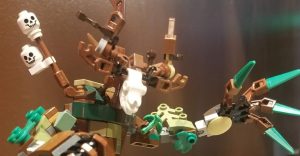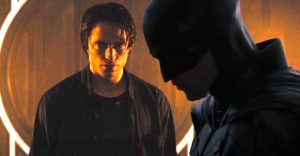Predator Ending Explained

1987’s Predator proved itself one of the greatest action movies of the ’80s and spawned a successful franchise, but its story and ending actually explore much deeper themes. John McTiernan’s Predator is an undeniable classic, continuing Arnold Schwarzenegger’s domination of the action movie scene of the 1980s. Predator‘s success marked the beginning of a franchise, with a number of sequels expanding upon the story of its titular predator, an alien creature who traveled to Earth to experience the thrill of the hunt.
Schwarzenegger stars as Major Alan “Dutch” Schaefer, the leader of a team of military rescue personnel who are tasked with rescuing a foreign cabinet minister and his aide from insurgents in the Central American jungle. While going about their mission, Dutch comes to realize that he and his team have been misled: they were called in under false pretenses in order to stop a planned Russian-back invasion of the US. However, Dutch and his team soon encounter the Predator, an alien creature with highly advanced weaponry intent on hunting the men one by one.
As the Predator picks off Dutch’s team, tensions mount as they become more afraid of the creature lurking in the jungle. Before long, it’s down to just Dutch and the Predator, leading to one of the most epic showdowns in action movie history. After outsmarting and wounding the Predator and forcing it to engage its self-destruct device, Dutch narrowly manages to escape the jungle with his life. He walks away from the experience as a changed man, haunted by his encounter with the creature and the deaths of his team.
Why The Predator Chooses To Hunt Dutch & His Team
There’s an interesting implication as to why exactly the Predator chooses to hunt Dutch and his team. After all, there were plenty of insurgents in the jungle that it seemingly chose not to hunt. As Dutch and his team encounter skinned corpses upon their arrival in the jungle and identify them as Green Berets, it’s implied that the Predator only chooses to hunt the most skilled. Interestingly, there’s also an indication as to exactly when the Predator identifies the team as its intended prey.
After locating the insurgents, Dutch and his men take out their entire camp despite being significantly outnumbered. This implies that the Predator witnessed the scene, identified the rescue team as worthy adversaries, and then set about killing them one at a time. The fact that Hawkins is the first to die shortly after – not to mention that the Predator spares Anna who wasn’t a part of the team’s attack on the camp – makes this seem the most likely reason for the Predator’s actions.
Predator’s Heat Vision Plot Hole Explained
Though the film may not be overly burdened by facts and logic, Predator is more realistic than it seems in many ways. That realism makes one apparent plot hole all the more irritating. As Predator doesn’t weigh itself down by establishing how the alien technology works, it leaves elements of the creature’s weaponry open to interpretation. This seemingly creates plot holes regarding the Predator’s use of heat vision. Using a form of infrared imaging, the Predator hones in on the heat signatures of Dutch and his team. However, in a hot jungle, this type of equipment would logically be far less efficient. What’s more, Dutch’s use of mud to mask his heat signature wouldn’t work – eyes still emit heat, so the Predator would have been able to see him.
The simple answer to these plot holes is that the Predator’s weapons and technology are alien in nature, and therefore they don’t necessarily function in the same way that human technology does. It’s not even entirely clear whether the Predator is tracking heat signature or something else – it could be tracking the movement of blood or picking up chemicals from inside the human body, for example. Put simply, as Predator doesn’t offer any rules for how the Predator’s equipment functions, it can’t truly be subjected to close scrutiny.
Dutch Survives Predator For An Unexpected Reason
Though it would seem that Dutch only survives his encounter with the Predator thanks to his quick thinking and impressive combat skills, there’s actually another reason he was able to get away with his life. It has been suggested that the Predator actually allows Dutch to escape after he spares its life, and it makes far more sense than the alternative. After gaining the upper hand, Dutch declines to finish the creature off, to which the Predator responds by engaging its self-destruct mechanism. However, context clues indicate that this wasn’t done to kill Dutch, but rather as a means of achieving an honorable death. The timer on the mechanism allows Dutch time to get away, and this seemingly indicates that the Predator wasn’t trying to kill him at all – if it was, it could have attempted to do so immediately after he opted to spare its life.
Predator Is A Statement About The Fragility Of Toxic Masculinity
Though it may seem like a fairly superficial action movie, Predator actually explores much deeper themes than it gets credit for. Director John McTiernan considers the film to be a statement about the ridiculousness of action movie machismo. When watching with this in mind, it becomes clear what Predator is really about. Heading into the jungle with their huge guns (and equally huge muscles), Dutch and his men are filled with confidence. However, they soon realize that their military might means nothing to the advanced Predator, and their confidence is stripped away. This clearly represents the team’s fragile masculinity, because it’s only by letting go of his ego and thinking critically that Dutch is able to gain the upper hand over the Predator using his mud mask trick.
Interestingly, the way in which the predator seems to select its victims also evidences this theme. It seems to select the most violent and confident soldiers to kill – first the Green Berets, then Dutch’s team. This appears to be a subtle reference to American militarism: the American soldiers’ over-sized guns and cavalier attitudes make them targets for the Predator, while the insurgents are left alone by the creature.
What Predator’s Ending Really Means
Predator‘s ending sees Dutch narrowly escape with his life, but he’s visibly changed by his encounter with the creature. Though Dutch entered the jungle filled with confidence in his abilities, he leaves it shaken and haunted by the brutal deaths of his friends. In that sense, the original Predator‘s ending makes it a statement on war and its ability to change even the most hardened people.
It’s also important to note the manner of Dutch’s victory. It’s been suggested that he only survives because he showed the Predator mercy, overriding his hypermasculine violent impulse to kill the creature in order to treat it with respect. This also speaks to the themes of fragile masculinity – Dutch survives because he puts down his weapons and uses his wits to overcome his adversary, and then shows it a small kindness after its defeat. In many ways, Predator‘s ending is perhaps the most intriguing part of the movie, because it so perfectly speaks to the deeper narrative themes of the film.






















